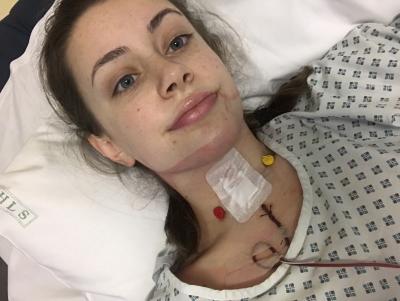‘Am I going to die?’ was the last question I ever thought I’d ask myself at 17
Natalie
While survival rates are high among young people with cancer, a diagnosis can naturally trigger fears about mortality. Here, Natalie reflects on how she dealt with this anxiety after she heard she had cancer.
Content warning: This story talks about fears of death and dying.
Something I never thought I’d find myself doing at the age of 17 was having to face my own mortality.
I think cancer is one of those things where for a lot of people it is synonymous with death. Even before I was diagnosed, if I had been told that a family member of someone I knew had cancer, the first question in my head would be, ‘Are they going to survive this, are they going to die?’
So to suddenly, almost out of nowhere, have to ask that question about yourself, is terrifying and very surreal.
I’d had surgery to remove half my thyroid gland before I was eventually diagnosed with thyroid cancer, so then when we were called back in and had the biopsy results explained to us, I can remember being completely numb during that entire conversation.
My prognosis was very positive – it was so positive in fact that they didn’t even mention survival rates, because as far as they were concerned it was pretty much predetermined that I was going to be fine at the end of it.
But that meant that in my head I was sitting there thinking, ‘OK but am I going to die, what’s going to happen to me next?’
After I’d spoken to my consultant, I sat with my parents in this little office in silence, just kind of taking it in, thinking, ‘Don’t cry, don’t cry, we’ll cry later’. Then my Teenage Cancer Trust Nurse and the Clinical Liaison Nurse walked in and sat down, and I can remember just looking at them and saying, ‘Well, am I going to die? Am I going to survive this?’
They answered my questions and reassured me. The fact was, thanks to my prognosis, I was always going to be fine – I was very lucky in that sense. But there was still a little bit of doubt in the back of my mind that was like, ‘Yeah, but what if something goes wrong?’
I remember I wrote letters to all the people I was really close with at the time – my family, my friends. I think I even wrote one to my Head of Sixth Form, which makes me laugh now, I’m not sure why I did that! And they were just letters that I kept, I didn’t send them or tell anyone that they existed.
I was less concerned with the fact that I could die and more concerned with how it was going to affect my family and how they would possibly pull through.
I wrote the letters because that was the only thing I could do that would potentially ease that pain – I thought they’d want to have that sort of thing if the worst happened.
And then once it was clear that I was going to survive, I just went downstairs and I shredded every single one of those letters.
That’s an experience that no normal 17-year-old should ever go through, but unfortunately some of us do.
Further support
Even though most young people with cancer are given a positive prognosis and there are a range of different treatment options available, we mustn’t forget that sadly not every young person makes it through cancer.
Finding out your treatment won’t work, and that the hospital team won’t be able to get you better, can be a shock. If this has happened to you or someone close to you, you might find this page helpful: What happens if your cancer treatment stops working
Your clinical team, Teenage Cancer Trust Nurse or Youth Support Coordinator will always be happy to talk to you and your family about any worries you have throughout your experience of cancer. They’ll do whatever they can to help you, which may include referring you to specialist support.
If they’re not available, or if you’d rather speak to someone else, there are lots of places you can get support or access urgent help in times of crisis – please visit: Urgent help


